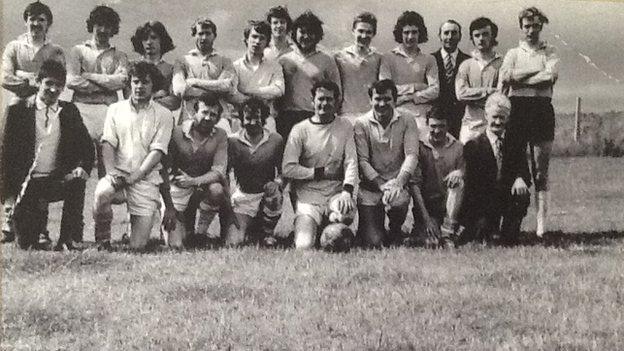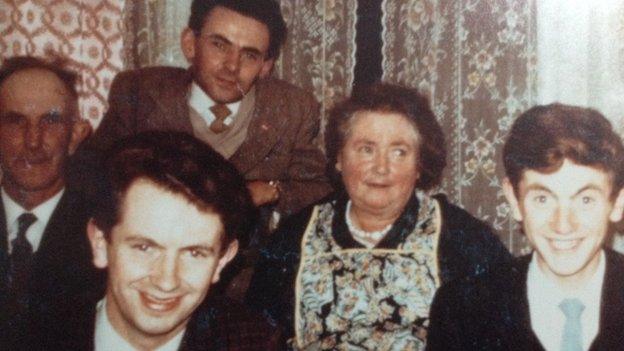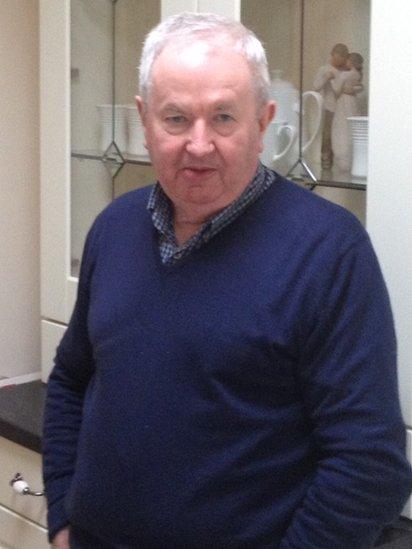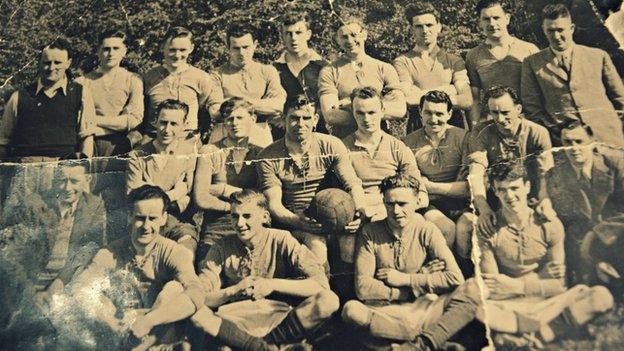St Colmcille's Gaelic football club, east Belfast: The team that disappeared
- Published

St Colmcille's Gaelic football team pictured in 1970-71
The St Colmcille's Gaelic football team in east Belfast disappeared without trace in the early 1970s, forced out of existence as the Troubles took hold in Northern Ireland.
However, for a brief period in the 1960s the team had flourished, playing competitive Gaelic football at their home pitch in the mainly loyalist Ballybeen estate in Dundonald.
A BBC Radio Ulster documentary has tracked down the former players to tell their story and look at how their lives were affected by the Troubles.
Warrenpoint man Seamus Murphy, 70, played for the team after he moved to Belfast to work at Stormont.
He recalled how one of the first attacks on the club's premises involved the goalposts being chopped down by an electric saw.
"It was such a professional job, it was unbelievable," he said.
For some of the other players, there was much worse to come.

Charlie O'Donnell senior (standing behind his son Charlie junior) was killed in a sectarian bomb attack
Charlie O'Donnell, the father of one of the main players, was killed in a sectarian bomb attack on his home in Grampian Avenue on 20 August 1973.
His footballer son - also called Charlie - recalled how on the night of the attack, "someone threw a brick in the window followed by a pipe bomb".
"My father tried to pick it up to extinguish it," he said.
"I remember seeing the flash and when I went into the house I couldn't see anything in the dark as the explosion had put the lights out.
"Afterwards I went up to Strandtown police station. I said to the police, my father is dead, isn't he? And they said 'yes'."
By the early 1970s, the club folded due to falling numbers.
Players and parents felt it was too dangerous to continue playing because of the level of intimidation, according to the team's goalkeeper and former chairman John McKeown.
"You were responsible for young teams, and parents too were saying 'we are not sending them out'," he said.
"Eventually I moved out of Ballyhackamore and by that time the club had more or less folded. We were no longer able to put out teams. Sadly we just had to fold."

Charlie O'Donnell junior played for the team
St Colmcille's GAA club first existed in the early 1950s, but then it faded away,
In the early 1960s it came back again when it played in a North Down Gaelic football league against other teams that were sprouting up in the north of the county, such as Scrabo Harps in Newtownards, and St Comgall's in Bangor.
The league was reported on in a Gaelic games column in the Newtowards Chronicle, written by Joe McCormick.
Mr McCormick said: "Some of the matches were played in Londonderry Park in Newtownards.

St Colmcille's Gaelic football team flourished in the 1960s
"The trick there was to tie wooden laths to the soccer goal posts, and this rudimentary arrangement attracted quite a lot of curiosity," he said.
The tragedy did not end with the demise of the team.
Former player Michael Cassidy, who later joined the prison service, was murdered by the IRA as he attended his sister's wedding in Augher in County Tyrone in April 1979.
Charlie O'Donnell, who played alongside him, said he was "a tremendous footballer".
"He played midfield and had a great ability to catch a ball in the air," he said.
"Unfortunately, tragically, somebody decided to take him out. Nice fella and a great footballer."
The Death of a Dream Team was first broadcast on 8 March and is available on the BBC iPlayer for 30 days.